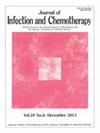In vitro to clinical efficacy: Neutralizing antibodies against severe acute respiratory syndrome coronavirus 2 strains
IF 1.9
4区 医学
Q3 INFECTIOUS DISEASES
引用次数: 0
Abstract
Introduction
Neutralizing antibodies have been approved for coronavirus disease 2019 (COVID-19) treatment; however, no study has clarified the link among their neutralizing effect in vitro, the period of infectious virus shedding, and symptoms in the acute phase. Here, we aimed to assess the duration of virus shed and fever in patients with mild COVID-19 stratified by their characteristics and type of neutralizing antibody administered.
Methods
We evaluated the efficacy of neutralizing antibodies in terms of the duration of infectious virus excretion and fever in three groups: patients infected with severe acute respiratory syndrome coronavirus 2 (SARS-CoV-2) Delta strain treated with REGEN-CoV2 (REGN-CoV2 group) and patients infected with Omicron strain treated with S309 (S309 group) or untreated (untreated group).
Results
REGN-CoV2 was significantly more effective in reducing viral load than S309; furthermore, S309 treatment did not show a significant reduction in fever duration when compared to no treatment. Mutations in the spike protein receptor-binding domain may reduce the binding ability of REGN-CoV2 and S309: the 50 % inhibitory concentration (IC50) of REGN-CoV2 for the conventional and Delta strains was 0.013 and 0.019 μg/mL, respectively, and that of S309 for the Omicron strain was 53.1 μg/mL.
Conclusion
Laboratory evaluations are helpful for analyzing the clinical efficacy of neutralizing antibodies, and this study will help in not only considering effective treatments for COVID-19 but also addressing the threat of future unknown viral infections.
体外与临床疗效:中和抗体对抗严重急性呼吸综合征冠状病毒2株。
中和抗体已被批准用于2019冠状病毒病(COVID-19)的治疗;然而,没有研究澄清它们在体外的中和作用、传染性病毒脱落的时间和急性期症状之间的联系。在这里,我们的目的是评估轻度COVID-19患者的病毒传播和发烧的持续时间,根据患者的特征和给予的中和抗体类型进行分层。方法:采用REGEN-CoV2 (REGN-CoV2组)治疗严重急性呼吸综合征冠状病毒2型(SARS-CoV-2) δ型感染患者和S309 (S309组)或未治疗组(未治疗组)治疗的Omicron感染患者,从感染病毒排泄时间和发热时间方面评价中和抗体的疗效。结果:REGN-CoV2降低病毒载量的效果明显优于S309;此外,与未治疗相比,S309治疗并没有显着减少发烧持续时间。穗蛋白受体结合域突变可降低REGN-CoV2和S309的结合能力:REGN-CoV2对常规菌株和Delta菌株的50%抑制浓度(IC50)分别为0.013和0.019 μg/mL,而S309对Omicron菌株的50%抑制浓度(IC50)为53.1 μg/mL。结论:实验室评价有助于分析中和抗体的临床疗效,本研究不仅有助于考虑对COVID-19的有效治疗,而且有助于应对未来未知病毒感染的威胁。
本文章由计算机程序翻译,如有差异,请以英文原文为准。
求助全文
约1分钟内获得全文
求助全文
来源期刊

Journal of Infection and Chemotherapy
INFECTIOUS DISEASES-PHARMACOLOGY & PHARMACY
CiteScore
4.10
自引率
4.50%
发文量
303
审稿时长
47 days
期刊介绍:
The Journal of Infection and Chemotherapy (JIC) — official journal of the Japanese Society of Chemotherapy and The Japanese Association for Infectious Diseases — welcomes original papers, laboratory or clinical, as well as case reports, notes, committee reports, surveillance and guidelines from all parts of the world on all aspects of chemotherapy, covering the pathogenesis, diagnosis, treatment, and control of infection, including treatment with anticancer drugs. Experimental studies on animal models and pharmacokinetics, and reports on epidemiology and clinical trials are particularly welcome.
 求助内容:
求助内容: 应助结果提醒方式:
应助结果提醒方式:


